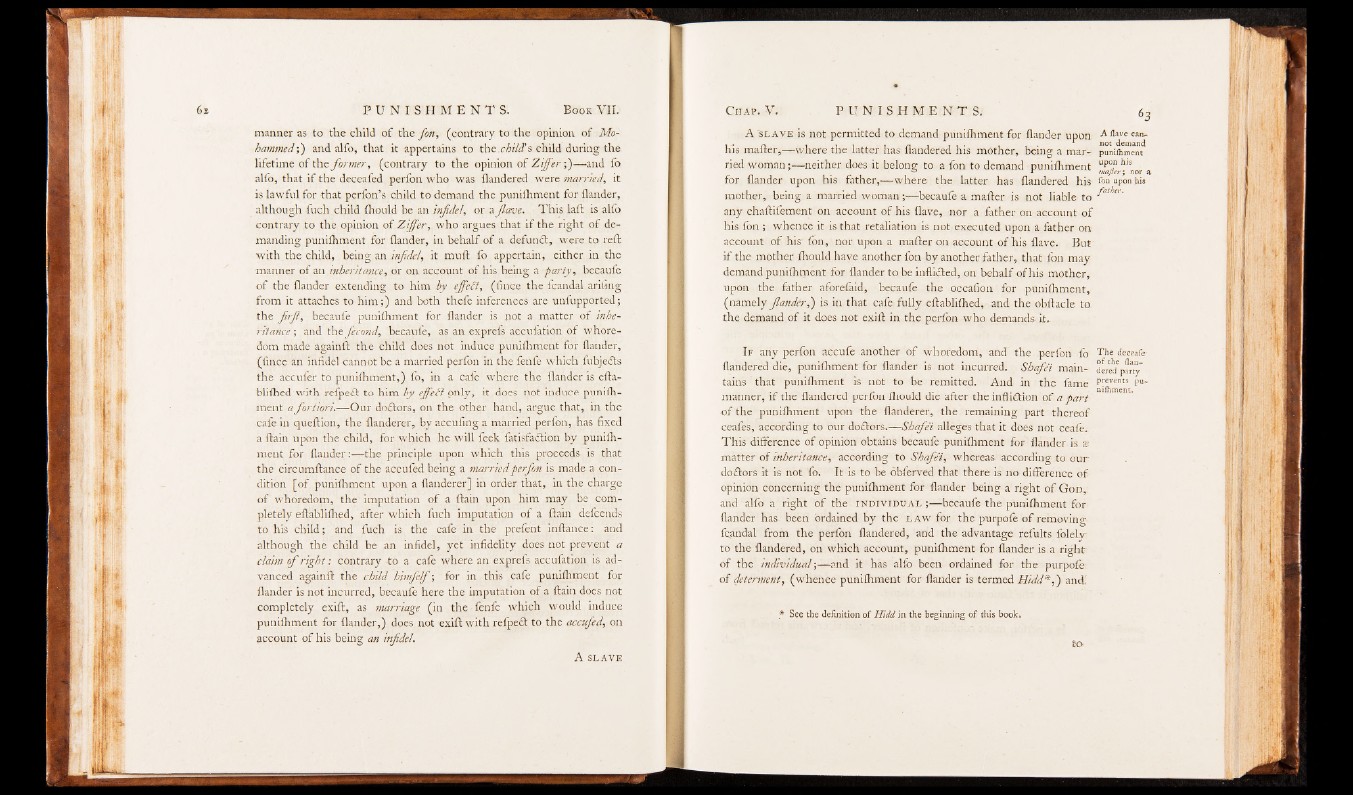
manner as to the child of the fon, (contrary to the opinion of Mohammed
;) and alfo, that it appertains to the.child's child during the
lifetime of the former, (contrary to the opinion of Ziffer ;)— and fo
alfo, that if the deceafed perfon who was flandered were married, it
is lawful for that perfon’ s child to demand the punifhment for Hander,
although fuch child fhould be an in f del, or a Jlave. This laft is alfo
contrary to the opinion of Ziffer, who argues that if the right of demanding
punifliment for Hander, in behalf of a defunft, were to reft
with the child, being an in f del, it muft fo appertain, either in the
manner of an inheritance, or on account of his being, a party, becaufe
of the Hander extending.fto him by effeât, (fines the fcandal ariling
from it attaches to him;) and both thefe inferences are unfupported;
the fir f , becaufe punifhment for Hander is not a matter of inheritance
; and thefécond, becaufe, as an exprefs accufation of whoredom
made againft the child does not induce punifhment for Hander,
(fince an infidel cannot be a married perfon in the fenfe which fubjedts
the accufer to'punifhment,) fo, in a cafe where the Hander is efta-
blifhed with refpedt to him by effetd only, it does not induce punifhment
a fortiori.— Our dodtors, on the other hand, argue that, in the
cafe in queftion, the flanderer, byaccufinga married perfon, has fixed,
a ftain upon the child, for which he will feek fatisfadtion by punifhment
for Hander;— the principle upon which this proceeds is that
the circumftance of the accufed being a married perfon is made a condition
[of punifhment upon a flanderer] in order that, in the charge
of whoredom, the imputation of a ftain upon him may be completely
eftablifhed, after which fuch imputation of a ftain dçfcends
to his child ; and fuch is the cafe in the prefent inftance : and
although the child be an infidel, yet infidelity does not prevent a
claim o f right: contrary to a cafe where an exprefs accufation is advanced
againft the child himfelf ; for in this . cafe punifhment for
Hander is not incurred, becaufe here the imputation of a ftain does not
completely exift, as marriage (in the fenfe which would induce
punifhment for Hander,) does not exift with refpedf to the accufed, on
account of his being an mfdel.
A SLAVE
A slave is not permitted to .demand punifhment for Hander upon
his mafter,— where.the latter has flandered his mother, being a married
woman;— neither does it;belong to a fon to demand punifhment
for Hander upon his father,— where the latter has flandered his-
mother, being a married woman ^becaufe a mafter is not liable to
any chaftifement bn account of his Have, nor a father on account of
his fon ; whence it is that retaliation is not; executed upon a father on
account of his~ fon, nor upon a mafter on account of his Have. But
if the mother fhould have another fon by another father, that fon may
demand punifhment for Hander to be inflifted, on behalf of his mother,
upon the father aforefaid, becaufe the occafion for punifhment,
(namely fancier,) is in that cafe fully eftablifhed, and the obftacle to.
the demand of it does not exift in the perfon who demands- it..
I f any perfon accufe another of whoredom, and the .perfon fo
flandered die, punifhment for Hander is not incurred. Shafei main-
taink that punifhment is not to be remitted. And in the fame
manner, if the flandered perfon fhould die after the infli&ion of a part
of the punifhment upon the flanderer, the remaining part thereof
ceafes, according to our dodtors.— Shcfei alleges that it does not ceafe..
ThS^difference of opinion obtains becaufe punifhment for Hander is. a?
matter of inheritance, according to Shafei, whereas according to. our
doftors it is not 'fo. It is'to be obferved that there is no difference of
opinion concerning the punifhment for Hander being a right of G o d ,:
and alfo a right of the individual;— becaufe the punifliment for
Hander has been ordained by the law for the purpofe of removing
fcandal from the perfon flandered, and the advantage refults foleLy
to the flandered, on which account, punifhment for flander is.a right
of the individual;—-and it has alfo been ordained for the purpofe
of determent, (whence punifliment for flander is termed Hidd*,") and,'
* See the definition o f Hidd in. the beginning o f this book.
to>
A Have cannot
demand
punifhment
upon his
majier; nor a
fon upon his
father.
The dèceafe-
of the flandered
party
prevents pu.,
nifhment.